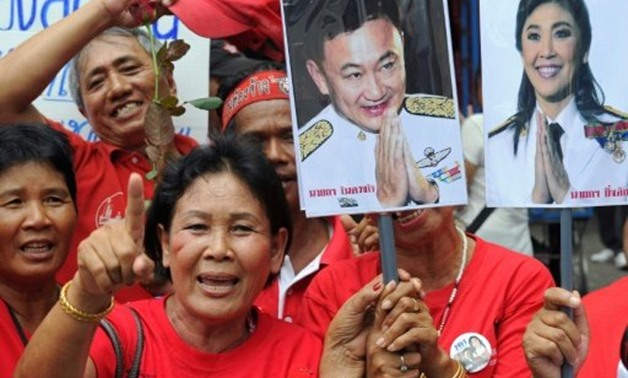
© AFP/File / by Jerome TAYLOR | There are no other members of the Shinawatra clan who carry the same star power as Thaksin or Yingluck
BANGKOK - 25 August 2017: On Friday Thailand's ousted prime minister Yingluck Shinawatra failed to show up for the verdict in her trial for criminal negligence, sparking an arrest warrant and feverish speculation as to her whereabouts.
The trial, which could have seen Yingluck jailed for up to ten years and banned for life from politics, is just the latest in a slew of legal and political challenges faced by her family in the last decade.
So who are the Shinawatras and why are they so controversial?
- The Shinawatra backstory -
At the heart of Thailand's current political divide sits one man -- Thaksin Shinawatra, Yingluck's older brother.
Born into a middle class Sino-Thai family in the northern city of Chiang Mai, Thaksin began his career as a police officer before switching to business in the 1980s and making billions as a telecoms tycoon.
He turned to politics and swept to victory in 2001, dramatically building his own strong political network and riling the conservative establishment.
With his pro-poor policies he won a landslide again in 2005, making him the only Thai prime minister to have seen out a whole term and be re-elected.
But he was booted from power by the military in 2006, sparking instability that Thailand has yet to shake off.
Thaksin, 68, lives overseas to avoid jail for corruption.
- Why are the Shinawatras popular? -
Every Thai general election since 2001 has been won by Shinawatra parties.
Their support remains strong among Thailand's populous but poor rural northern portion and the Bangkok working class.
Economics plays a huge role.
Inequality is rampant in Thailand and the country's poor long felt ignored by Bangkok's dominant elite.
The Shinawatras rolled out policies such as universal healthcare, debt relief, loans for start-up business and big rice subsidies for farmers.
That last policy, the rice scheme, was what ended up putting Yingluck in court.
- So why do many dislike them? -
Thaksin intially won over chunks of the Bangkok business elite.
But he came to be loathed by that same group as well as the military who have hit Shinawatra governments with two coups.
The family were accused of corruption and enriching themselves and their allies while buttressing their vote banks with costly populist policies.
Yingluck's rice scheme, which purchased rice at nearly twice the market rate, was a catalyst for middle-class street protests that presaged the 2014 coup.
Thaksin is also criticised for an authoritarian streak, evidenced by a deadly drug war that saw around 3,000 shot dead.
But his supporters say Bangkok's conservative elite, including forces within the palace, have acted simply to protect their monopoly on power.
- How has their influence been curbed? -
Coups and courts.
The military ousted Thaksin in 2006 and his sister's administration in 2014. In between, two more Shinawatra-allied prime ministers were dismissed by the courts.
Thaksin has had $1.3 billion in assets seized while Yingluck faces a damages claim worth $1 billion.
Their political networks and allies in the police have also been hacked back.
The military say they are simply restoring order after years of protests and deadly political violence.
But suspicion lingers that the country's top generals are firmly in the anti-Shinawatra camp.
Before his 2014 coup, current junta chief Prayut Chan-O-Cha played a key role in quashing pro-Shinawatra "Red Shirt" protests in 2010 that saw more than 90 people gunned down in Bangkok.
- Are they down and out for good? -
The Shinawatras are certainly on the ropes.
Over the last ten years they have been drummed out of office and faced a barrage of legal challenges.
Red Shirt leaders have either been jailed or gone to ground.
Now with Yingluck's disappearance they risk losing the last remaining charismatic figurehead with the family name.
There are no other members of the Shinawatra clan who carry the same star power as Yingluck or her brother.
The family still command a huge and loyal following.
But barring an unexpected amnesty -- or even a royal pardon -- Thaksin is unlikely to set foot on Thai soil again and Yingluck's future is now more uncertain than ever.
"This is the end of the Shinawatra clan because it means they have given up," prominent Thai commentator Atukkit Sawangsuk, who regularly features on the Shinawatra-owned Voice TV, wrote on his Facebook page on Friday.
"Even though (their) party exists and they still have support from the people, the whole clan has to step away and cannot play a leading role."


Comments
Leave a Comment